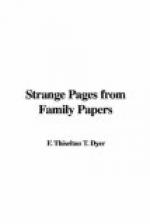But, strange and varied as are the scenes that have taken place at the banquet, whether great or small, such acts of fratricide have been rare, although, according to a family tradition relating to Osbaldeston Hall, a similar tragedy once happened at a family banquet. There is one room in the old hall whose walls are smeared with several red marks, which, it is said, can never be obliterated. These stains have some resemblance to blood, and are generally supposed to have been caused when, many years ago, one of the family was brutally murdered. The story commonly current is that there was once a great family gathering at Osbaldeston Hall, at which every member of the family was present. The feast passed off satisfactorily, and the liquor was flowing freely round, when, unfortunately, family differences began to be discussed. These soon caused angry recriminations, and at length two of the company challenged each other to mortal combat. Friends interfered, and, by the judicious intervention on their part, the quarrel seemed to be made up. But soon afterwards the two accidentally met in this room, and Thomas Osbaldeston drew his sword and murdered his brother-in-law without resistance. For this crime he was deemed a felon, and forfeited his lands. Ever since that ill-fated day the room has been haunted. Tradition says that the ghost of the murdered man continues to haunt the scene of the conflict, and during the silent hours of the night it may be seen passing from the room with uplifted hands, and with the appearance of blood streaming from a wound in the breast.[17]
But, turning to incidents of a less tragic nature, an amusing story is told of the Earl of Hopetoun, who, when he could not induce a certain Scottish laird, named Dundas, to sell his old family residence known as “The Tower,” which was on the very verge of his own beautiful pleasure grounds, tried to lead him on to a more expensive style of living than that to which he had been accustomed, thinking thereby he might run into debt, and be compelled to sell his property.
Accordingly, Dundas was frequently invited to Hopetoun House, and on one occasion his lordship invited himself and a fashionable shooting party to “The Tower,” “congratulating himself on the hole which a few dinners like this would make in the old laird’s rental.” But, as soon as the covers were removed from the dishes, no small chagrin was caused to Lord Hopetoun and his friends when their eyes rested on “a goodly array of alternate herrings and potatoes spread from the top to the bottom,” Dundas at the same time inviting his guests to pledge him in a bumper of excellent whiskey. Drinking jocularly to his lordship’s health, he humorously said, “It won’t do, my lord; it won’t do! But, whenever you or your guests will honour my poor hall of Stang Hill Tower with your presence at this hour, I promise you no worse fare than now set before you, the best and fattest salt herrings that the Forth can produce, and the strongest mountain dew. To this I beg that your lordship and your honoured friends may do ample justice.”




